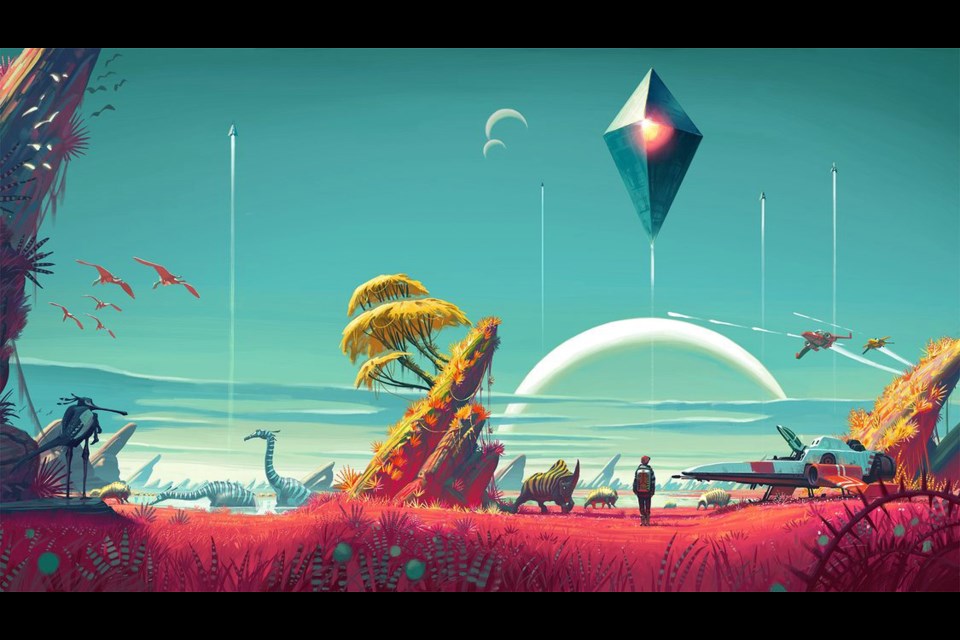Back in December 2013, in my small dorm room at Carleton University, my roommate and I sat on our respective beds, taking in the mess that was the Video Game Awards on Spike TV.
Everything seemed very unco-ordinated and unremarkable, but one trailer saved the night.
No Man’s Sky was introduced as a survival/exploration game set in a procedurally generated universe. That means, on a very basic level, that everything in the entire game is randomly generated based on algorithms and rule sets laid out by the developers.
The entire game is set in space so you start on a small planetoid and must forage for supplies. Once you have enough resources to power a ship you can travel to space and explore nearby planets. Everything is seamless so you clamber into the cockpit of your ship, take off, and point towards the stars. The terrain begins to disappear behind you as you climb into the sky, leave the planet’s atmosphere, and rocket into the black void that is space; a blank roadmap with endless possibilities.
This sounds like a dream come true for every gamer: an endless playground to explore.
You can devote yourself entirely to exploration, jumping from planet to planet, naming everything you discover and hopping between solar systems, slowly working your way towards the enigmatic centre of the universe.
Or, you can simply collect resources and trade them, growing your wealth and mining every planet until it’s dry. There is also plenty of combat to do in space, believe it or not. Fleet of massive warships and pirate colonies make for imposing enemies, firing off waves of lasers and neon-coloured bullets.
Every single avenue in No Man’s Sky has the potential for endless possibilities, but is it too good to be true?
The game has been in development for more than three years, in which time we have seen plenty of trailers and roughly an hour of gameplay. But we still don’t know exactly what the minute-to-minute gameplay will look like. Despite seeing several 20-minute demos, we only know what exploring a planet and blasting off into space will look like.
Check out this 20 minutes of gameplay courtesy of IGN.
What will we be doing the rest of the time?
Hello Games, the developer of No Man’s Sky, has said that some of the planets in the game's vast universe will be virtually empty, save for a couple of minerals. If only a couple of the planets in the 18 quadrillion that form the game's world have the magnificently rich flora and fauna that have made every trailer captivate audiences worldwide, then the game may just fall flat.
In order to succeed, No Man’s Sky needs to live up to its promise. But with nearly three years of hype behind it, that may be easier said than done. It’s a survival game at its core, which means that you collect resources and combine them to form tools, fuels, food, and weapons.
No Man’s Sky clearly has the largest sandbox any game has ever offered players. Fully exploring even one bustling planet could take hours. But the surface of each planet has to be worth exploring, not just colorful barren wastes. It also can’t be filled to the brim with strange, otherworldly creatures and strange plants that contain even stranger materials. That too would grow boring rather quickly.
The game needs to strike a balance between discovering the unknown and working towards it.
But a lot of that work will likely be done as you trek through space, pointing your ship towards a distant planet and flying towards it, watching as it slowly grows to engulf your vision. And after your brief flight, you can then explore the planet if you choose or just move on, choosing to rummage through the innards of another planet instead.
The pure scope of No Man’s Sky is what makes it so unpredictable. It may be one of the most ambitious games ever made, and it was created by a team of fewer than 30 people. It is a passion project in every sense of the word, but if the concepts don’t fit together properly, the entire experience will fall flat and the insane levels of hype that have built up will fizzle out.
The length of its development cycle and its incredible ideas have caused many ears to perk up across the Internet. Even non-gamers I know are curious about this revolutionary new title on the horizon.
Its marketing has been less than stellar, but that’s because it’s an incredibly difficult game to promote. How can a three-minute trailer tell an audience of the millions of things you can do? But that is why we are here now, speculating.
If I had my way, No Man’s Sky would be great enough that, if I wanted to, it could be the only game I play for the rest of my days. We only have a week until it releases on Aug. 9.
No matter what happens with No Man’s Sky, I don’t think that it will either be fiercely fantastic or aggressively mediocre. There is no in-between for a game that has created so much excitement without being the follow-up to another game.
It will go down in gaming history, either way, we just have to wait and see how it will be remembered.
Matthew Herst is a Carleton University communications student, video game journalist and Sudbury.com’s resident geek writer. Yeah, this guy love’s video games. Besides Sudbury.com, you can also find his work on TheNerdStash.com. Follow him on Twitter @supergurst.
